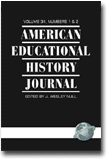
American Educational History Journal
Volume 34 #1 & 2
Edited by:
J. Wesley Null, Baylor University
A volume in the series: American Educational History Journal. Editor(s): Shirley Marie McCarther, University of Missouri-Kansas City.
Published 2007
The American Educational History Journal is a peer‐reviewed, national research journal devoted to the examination of educational topics using perspectives from a variety of disciplines. The editors of AEHJ encourage communication between scholars from numerous disciplines, nationalities, institutions, and backgrounds. Authors come from a variety of disciplines including political science, curriculum, history, philosophy, teacher education, and educational leadership. Acceptance for publication in AEHJ requires that each author present a well‐articulated argument that deals substantively with questions of educational history.
CONTENTS
Editor’s Introduction, J. Wesley Null. 2007 Presidential Address, Katherine M. Schuster. The Reading Circle Movement in Texas, Mindy Spearman. The Image of Women Teachers in Indian Territory in the Nineteenth
Century, Dana T. Cesar and Joan K. Smith. Single-Gender Public Education in the United States: Does No Child Left Behind Unlock the Door to Separate and Unequal Practices? Jennifer Friend. “With our own Wings We Fly”: Native American Women’s Clubs, 1899 to 1955, Lisa M. Tetzloff. American Pestalozzianism Revisited: Alfred Holbrook and the Origins of Object-Based Pedagogy in 19th Century America, Nathan R. Myers. The “Progressive” Educational Philosophy and Practices of Helen Lotspeich: A “Founding Mother” from the American Heartland, James Green. The Promise and Failure of Educational Television in a Statewide System: Delaware, 1964-1971, Robert J. Taggart. “Inexpedient and Unwise”: The First American External Degree Programs, 1876-1910, Von V. Pittman. The Agricultural Education Origins of the Morrill Land Grant Act of 1862, Lee S. Duemer. Spreading the News: Revisiting the History of the New York Free Academy Using 21st Century Technology, Sandra Roff. The New Departure Debate Surrounding Congressional Efforts to Create a National System of Education, 1871-1889, Mark Groen. National Emergency and Federal Junior Colleges in New Jersey: It Takes a Lot to Move Old New Jersey, Michael W. Simpson. High School Economic Education in Texas: 1920 to Present Paper Presented at the Annual Conference of Midwest History of Education Society, Rui Kang. Texas Standard: Spreading the Word to the Teachers’ State Association of Texas, Deborah L. Morowski. Editor’s Introduction, J. Wesley Null. Struggle for the Soul: William Heard Kilpatrick, Jared Stallones. We the Peoples: When American Education Began, Donald Warren. Did the Life Adjustment Movement Derail Teacher Education? Samuel J. Katz. Historical
Truth and Film: Inherit the Wind as an Appraisal of the American Teacher, Karen L. Riley, Jennifer A. Brown, and Ray Braswell. By the Numbers: Minimum Attendance Laws and Inequality of Educational Opportunity in Missouri, 1865-1905, Linda C. Morice and John W. Hunt. Educational Upheaval in the 1960s: Student Protest, Academic Freedom, and Police Intervention, Stephen H. Aby. The Soil of Silence: Deconstructing Socio-cultural and Historical Processes that Have Influenced Schooling for First Nations People and African Americans, Loyce E. Caruthers. From the Highlander Folk School to the Freedom Schools: A History of Critical Education, Jon H. Hale. The Ordinaryness of Institutional Racism: The Effect of History and Law in the Segregation and Integration of Latinas/os in Schools, Juan Carlos Gonzalez. Histories Taking Root: The Contexts and Patterns of Educational Historiography during the Twentieth Century, Paul J. Ramsey. Merged
Needs: A Grounded Theory Study of Integration in the South, Lee S. Duemer. Who’s in the Classroom Down the Hall? An Examination of Demographic Shifts within Segregated Special Education Classrooms, 1975–2005, Beth R. Handler. What’s in It for Us?: The Senior Project in the Evolution of a For- Profit University, Linda E. Urman.
-
Paperback978-1-59311-767-2
Web price: $62.04 (Reg. 72.99)
-
Hardcover978-1-59311-768-9
Web price: $89.24 (Reg. 104.99)
- eBook9781607526254

-
 American Educational History Journal
Volume 49
American Educational History Journal
Volume 49
-
 American Educational History Journal
Volume 45 # 1 & 2
American Educational History Journal
Volume 45 # 1 & 2
-
 American Educational History Journal
Volume 46 #1 & 2
American Educational History Journal
Volume 46 #1 & 2
-
 American Educational History Journal
Volume 47 #1 & 2
American Educational History Journal
Volume 47 #1 & 2
-
 American Educational History Journal
Volume 48
American Educational History Journal
Volume 48
-
 American Educational History Journal - Golden Anniversary Edition
Volume 50 Numbers 1 & 2
American Educational History Journal - Golden Anniversary Edition
Volume 50 Numbers 1 & 2
-
 Snapshots of History
Portraits of the 21st Century Pandemic
Snapshots of History
Portraits of the 21st Century Pandemic

